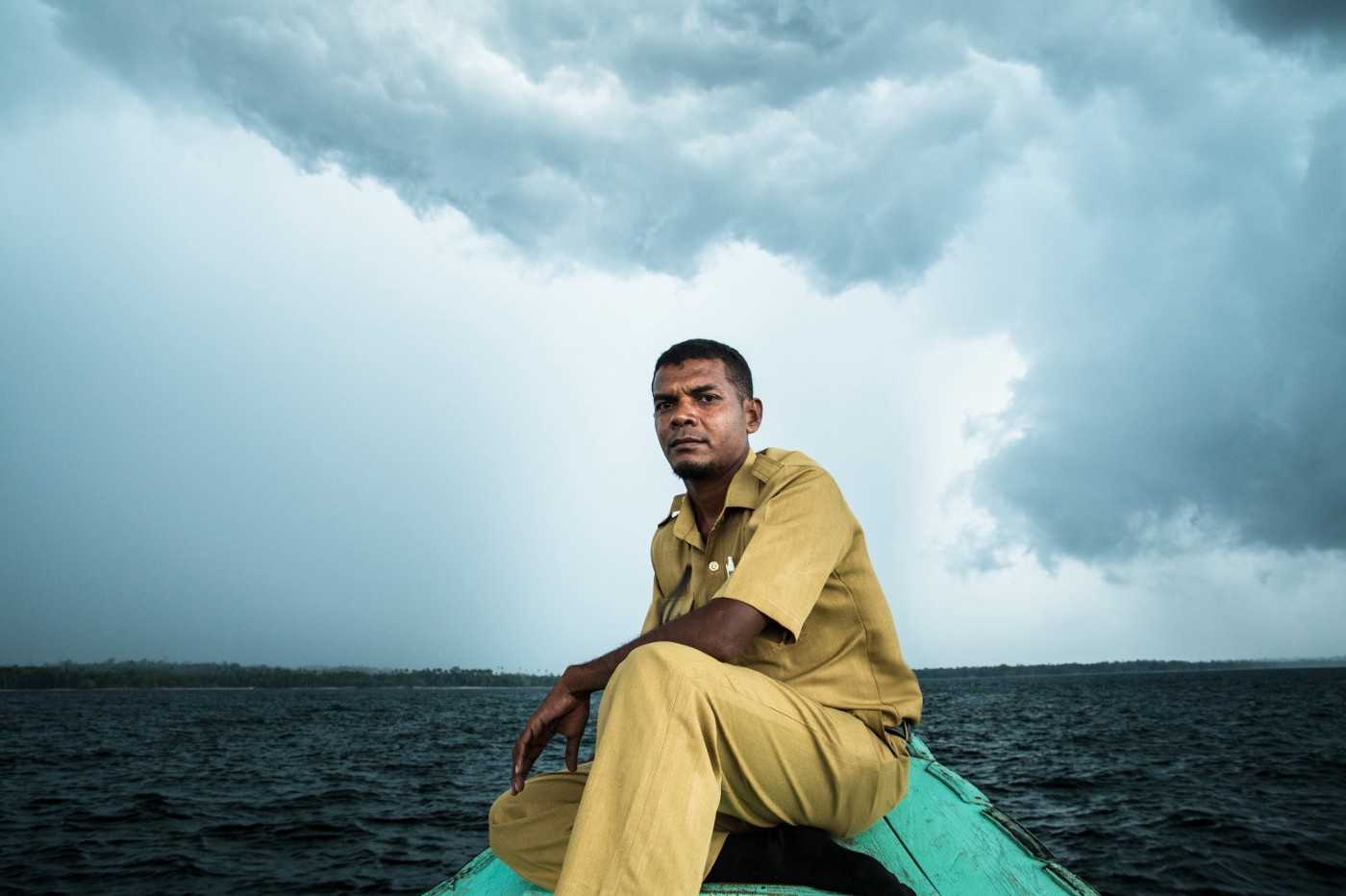
Indonesia For Sale
Indonesia’s best democratic instincts protected Aru's rainforests. Now it's democracy that needs saving.
How a grassroots fight for land rights connects to recent protests across Indonesia.
- The people of Indonesia’s Aru Islands fended off a land grab that would have led to the destruction of a vast area of rainforest, through a sophisticated grassroots campaign that held power to account.
- The campaign holds lessons for rural communities facing similar threats, but their prospects have been diminished by new legislation that strengthens the hand of the powerful and corrupt.
- The legislation has provoked mass street protests in the capital city, Jakarta. As in Aru, it now comes down to civil society to ensure that democracy prevails.
When Mika Ganobal, a 35-year-old civil servant, mounted the top of a van in the ramshackle town of Dobo to rouse a crowd of protesters, in 2013, it was an act that said much about how Indonesia had changed in its first 15 years of democracy.
Two decades earlier, the form of mass demonstration he helped organize, with thousands of people flooding the streets to protests against the government and a private company, would have been unthinkable. The tight grip of the authoritarian Suharto regime, and the constant threat of state violence, would have suppressed the very idea.
The act said just as much about how Indonesia had not changed. Almost a decade after they had elected their own district head, for the first time, the people of Aru discovered that that district head had sought to lease the majority of their land to investors, to be cleared for a giant sugar plantation.
The most immediate failing in democracy was apparent: a politician, elected by these people, had taken a decision so manifestly against their wishes, and entirely without their consent. Direct elections, at least in Aru, had delivered a leader taking decisions in the interests of a private investor above those of his constituents.
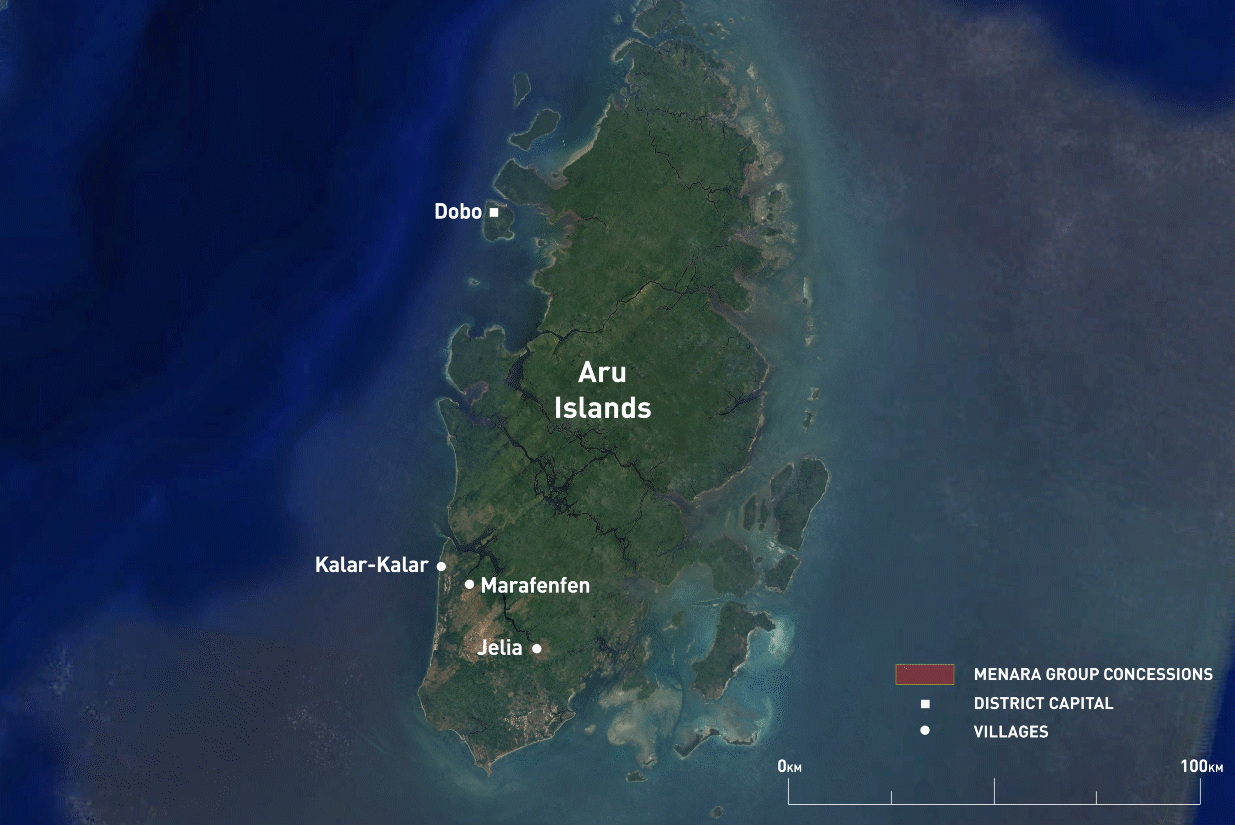
In most cases where community land is granted to private corporations in Indonesia, whether for mining or plantations, a deeper malaise usually sets in. District and provincial parliaments, police and ministries all act to support the transfer of land to investors, without the consent of the people. With thousands of conflicts over land across the country, many communities that push back fail to break through the noise and attract the attention of the media or influential institutions in the capital, Jakarta.
The breakdown in democratic accountability begins with local officials who exercise direct control over land. But almost all of the bodies that should subsequently act as a check on power, in a functioning democracy, fail too.
In Aru something different happened. Eight months after the movement was born, through a sophisticated campaign chronicled in-depth in “Saving Aru,” a recent article by The Gecko Project and Mongabay, the Aruese forced the government to cancel the project. They protested, gained media attention, deployed the new potential of social media, obtained the backing of district and provincial politicians, secured parliamentary hearings, and forced influential institutions to look into the case, before the project was finally killed by a government minister.
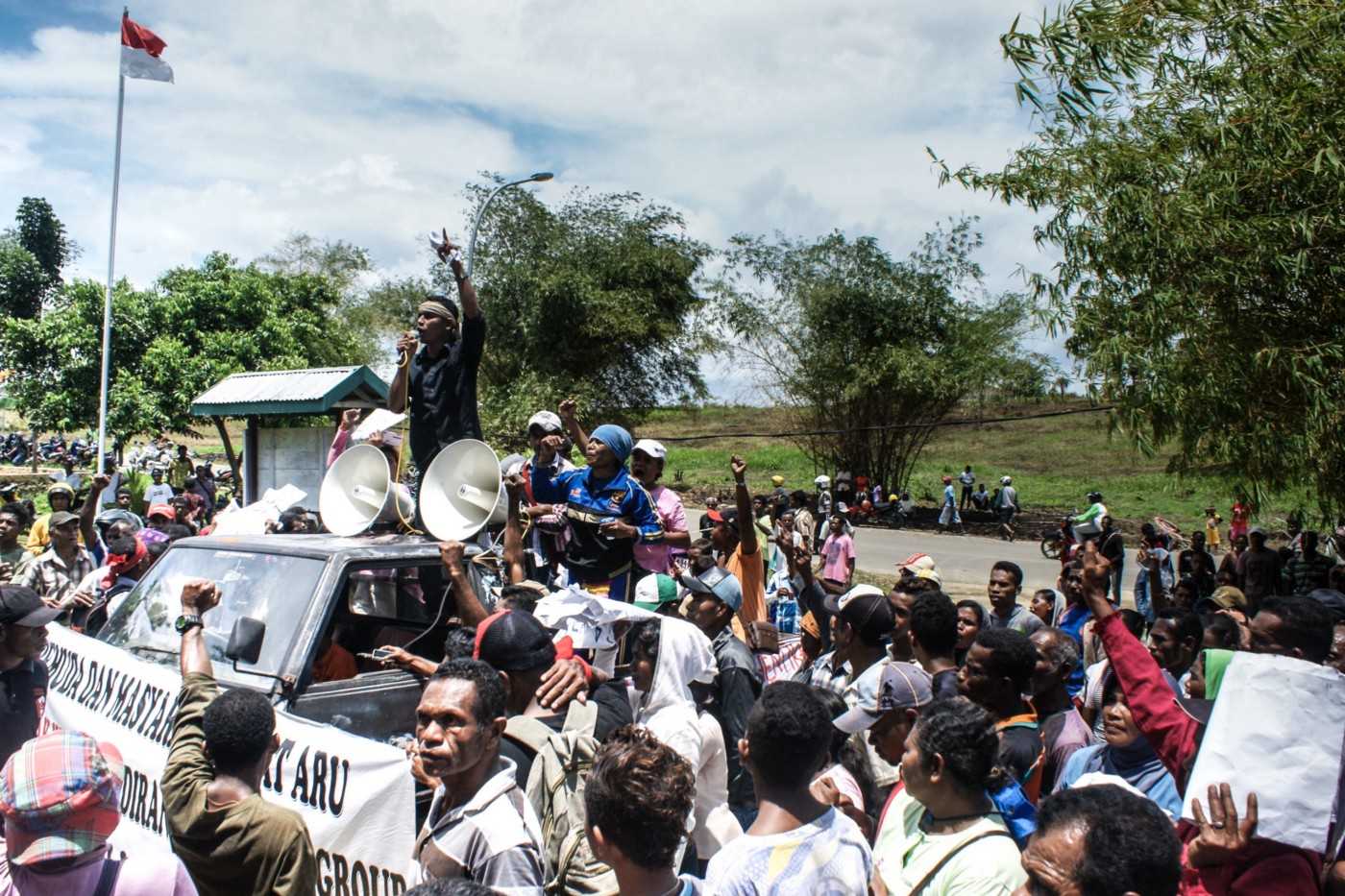
The obvious question is whether the methods the Aruese deployed could be replicated in other localised social movements to defend land rights in Indonesia. It’s a question that arises at an important inflection point in the nation’s political history, as the government embarks on an assault on the very things that helped save Aru. As Indonesia moves into its third decade of democracy, then, does it become more or less likely that other movements like it will win?
Saving Aru
From the very beginning, the sugar plantation project should have sounded alarm bells. The first permits for the project were issued by the district head, Theddy Tengko, just one month before he was charged with corruption for embezzling millions of dollars from the state budget. They were issued less than a week before he stood for re-election, in a campaign in which he was accused of illegally distributing money to voters.
Theddy was later convicted of corruption over his raids on the district budget, but there was no scrutiny of his decision to grant licenses across two-thirds of the entire district. The Aruese activists would later discover he had issued them illegally, without a legally required, public assessment of how the project would impact the people and environment of the district.
The project, the brainchild of a corrupt politician, ran roughshod over the rule of law and any safeguards the Aruese might have hoped would protect them.
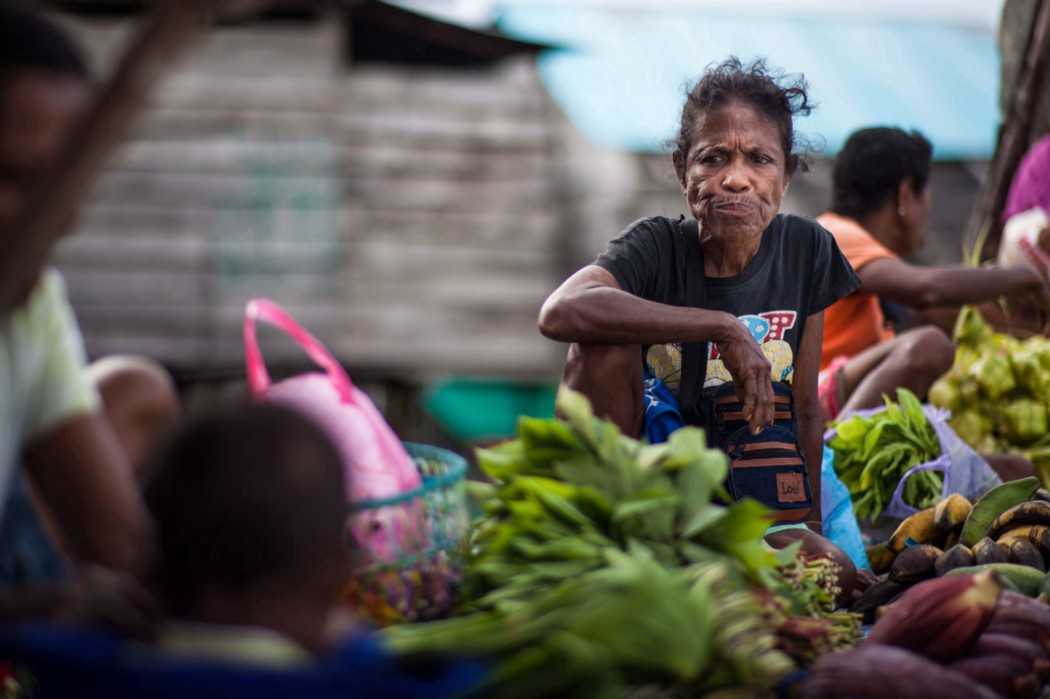
The Save Aru activists unearthed and repeatedly exposed the illegalities, the flawed science underpinning the project, and the groundswell of opposition to it. They broke through into the public consciousness by using social media platforms that buzzed with news, photos and graphics, generating attention across Indonesia and abroad.
They cleverly marshalled this attention to secure the backing of scientists, the biggest university in the provincial capital, the Protestant Church of Maluku, a provincial legislator named Mercy Barends, two national NGOs, and a famous R&B artist. Before long these individuals and institutions, and not just the activists, were all loudly outing the improprieties.
This helped them catch the attention of government watchdogs in Jakarta, notably an influential presidential agency, known as UKP4, and the Corruption Eradication Commission, or KPK. These wielded influence and, more importantly, teeth; the KPK’s record in arresting officials from the upper echelons of the state has earned it fear and respect in equal measure.

In the end, it was Zulkifli Hasan, then the minister of forestry, who canceled the project, just as he was signing off on the destruction of vast areas of forest and indigenous lands elsewhere in Indonesia.
That they were able to win depended in large part on the attention of powerful agencies. But it was this ecosystem of other actions — protest, media attention, online petitions, the support of politicians and “softer” institutions — that brought that pressure to bear. In that respect, no one thing killed the project. It was a groundswell of public opposition, filtered through multiple principles that can only thrive in a democratic society.
The methods used by the Aruese (outlined in more detail in a separate article by The Gecko Project and Mongabay) may hold lessons for any community facing the same challenge. Few campaigns are likely to generate the same level of attention that Save Aru did. But the principles of gathering and ruthlessly exposing evidence, intelligent use of social media, and of seeking support wherever it can be found, could still have an effect.
Yet Aru is also a cautionary tale. The lengths the activists had to go to, to secure the cancellation of a project so demonstrably flawed, exposed a political system functioning largely in the interests of the powerful.
What happened next, on the national stage, tells us that the political establishment in Indonesia were fully aware that was the case. And events in the past few weeks show how the fight to change this system is as vital now as it ever has been.
Saving democracy
The project was cancelled just months before President Joko Widodo took office in 2014. He was the first president to come from outside the military or political elite, elected on a wave of belief that he would re-inject energy into reformasi, the transition to democracy.
Millions of indigenous people believed a campaign promise that he would recognise and protect 12.7 million hectares of customary land, safeguarding them from precisely the kind of top-down project that threatened Aru. In the nine priorities for his administration he promised “clean, effective, democratic and reliable governance,” restoring faith in democratic institutions, and a reform of the “system and law enforcement” to rid them of corruption.
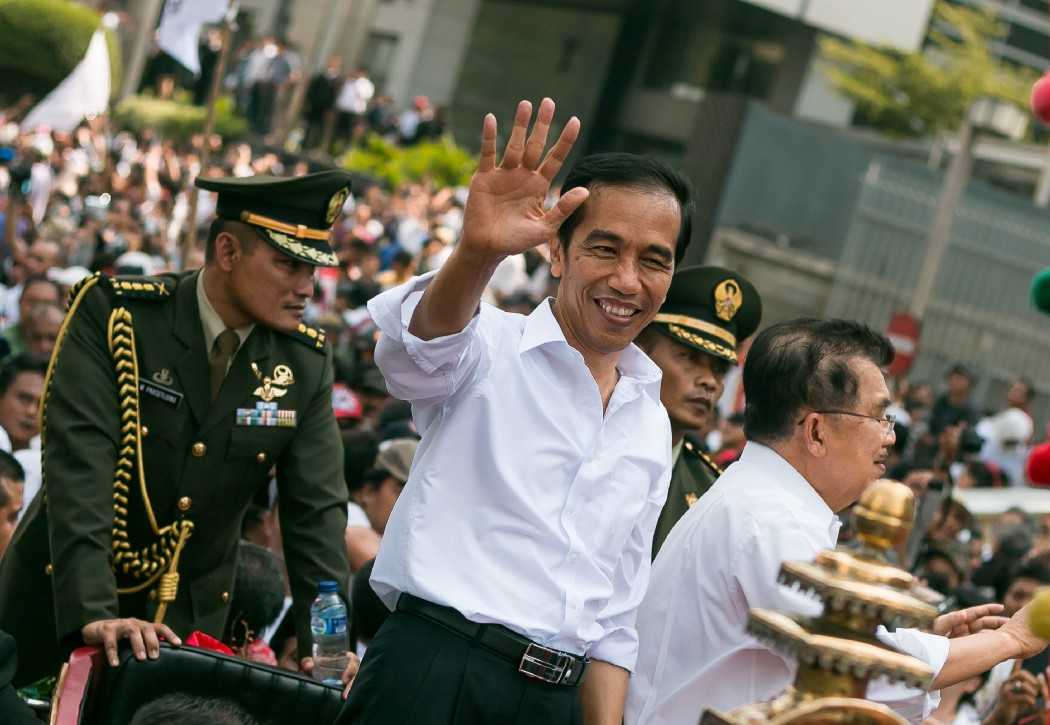
The statements were clear. Jokowi, as he is known, would redress the balance of power through the infrastructure of government, making both politicians and the oligarchs who controlled land, plantations and mines accountable to the disempowered. It was made clear in particular that he would strengthen the hand of the KPK, the nation’s most trusted institution, which had done more than any other to blunt the worst instincts of the political elite.
But neither the promised land rights reform nor the rebalancing of power through institutions ever arrived. Communities continued to lose their land, and land rights conflicts simmered unresolved through Jokowi’s first term. As it drew to a close he finally froze new permits for palm oil plantations, a particularly virulent driver of human rights abuses. But that measure is a sticking plaster that doesn’t address the systemic problems the Aruese and so many others have fought against.
In the past few weeks, on the cusp of Jokowi’s second term, that balance of power has lurched further in the wrong direction. The national parliament launched an assault on the very laws and institutions they needed to reinforce. Representatives have pursued a broad and swift legislative agenda that, critics in civil society say, will ease the transfer of rights and resources from the poor and increase the prospects that those who push back will face criminalisation at the hands of the police.
In the past few weeks, the balance of power has lurched further in the wrong direction.
Above all, an amendment to the KPK Law threatens to “destroy” the agency, attacking “the very institutional features and powers” the KPK deployed against the powerful. As recently as March this year, the KPK itself had proposed a quite different set of reforms, one that would criminalise the corrupt sell-off of land by politicians through influence trading and force courts to take the social and environmental impact of corruption into account.
This government assault on the state only diminishes the prospect that other campaigns like Save Aru can succeed, by eroding the few features of the system that worked in favour of the Aruese. But there are parallels between the response to the government actions in Aru, in 2013, and across the country today. Just as the people of Aru once flooded the streets of Dobo, tens of thousands of students took to the streets across the country to object to the assault on democracy.
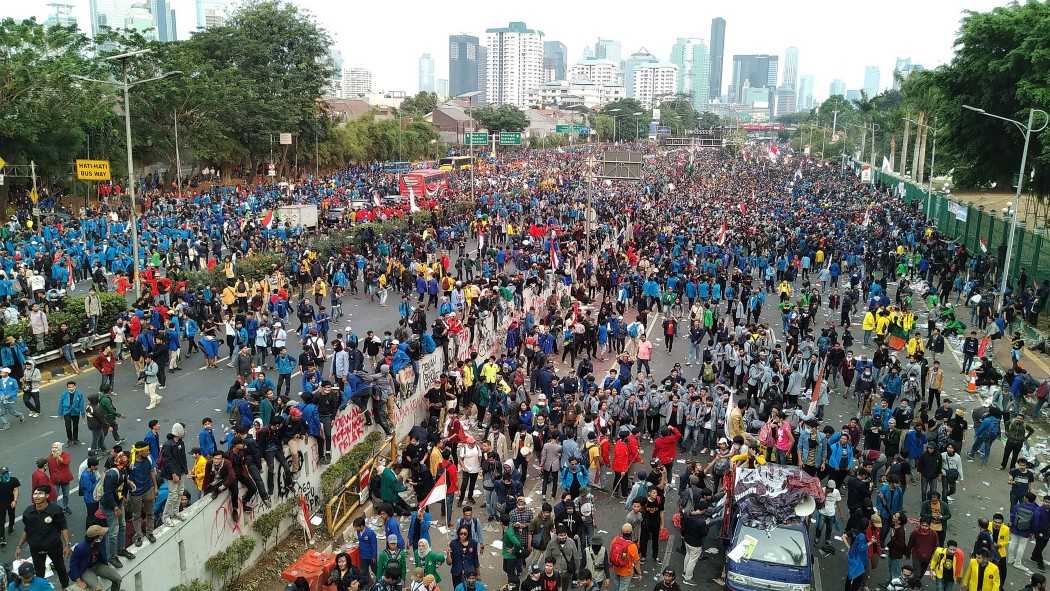
The measures the students are demonstrating against almost all entrench the power of elite interests, by diminishing civil liberties and the capacity of ordinary citizens to defend the disempowered. They also emerged in part because of a disaffection with Jokowi, the “good” leader who was supposed to defend those principles. His actions are a profound illustration that democratic health cannot be invested in the executive branch, but must rest in the institutions that pull against any powerful leader, amplifying their good instincts and taking the sting out of their worst.
Indeed, the students have articulated a broad and considered set of demands, aimed at balancing the power of the government, stemming the environmental destruction it has overseen, and preventing the criminalisation of communities who stand up against it. The fight for rural communities in Aru, and places like it, is now at the heart of the national consciousness. Their actions reveal that a deep belief in the same principles is coursing across Indonesian society.
In both cases the protests captured the attention of a global audience. In 2014, international attention helped push agencies in Jakarta to focus their attention on the fate of Aru. Today it may help focus the thoughts of the new Jokowi administration, to recognise that corruption and human rights violations could hamper its vision for economic development. A coalition of almost 100 organisations from across the world has urged the government to uphold anti-corruption principles agreed in international forums.
Ultimately, the Save Aru campaign is a reminder that even in the most unlikely circumstances, social movements can hold government to account, even when the levers of power are gripped firmly by the powerful.
Since the fall of Suharto, Indonesia has been held up as a successful democracy in large part due to its free and fair presidential elections. The actions of Theddy Tengko a decade ago, and Jokowi today, reveal the limitations of elections as a tool of accountability. They show that democracy doesn’t reside in an elected leader, but in the people and institutions who could hold them to account.
